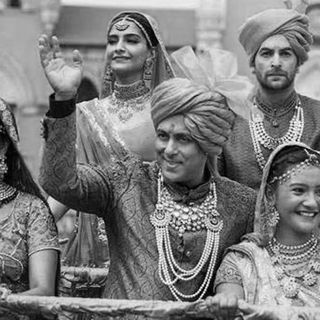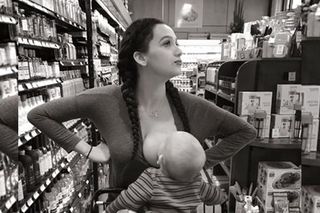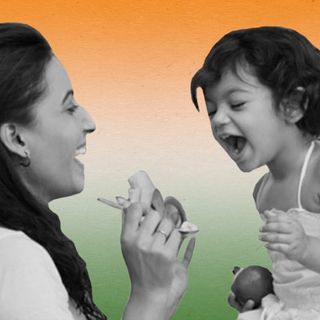
Can Indian Moms Breastfeed in Public Without Being Shamed?
Breaking down breastfeeding taboos can only help moms.

India didn’t always consider breastfeeding a taboo. Back in 1980, the Indian Postal Department released a stamp picturing a breastfeeding mother. It’s difficult to process the fact that today, breastfeeding in public has become enough of a taboo that it requires a movement to normalize it.
The act of breastfeeding is now mired in controversy. Shame is meted out to those who have the ‘gall’ to breastfeed in public, and even those who choose to breastfeed in the privacy of their home. Mothers are judged for breastfeeding too little, too much, or not at all.
Thankfully, international organizations like UNICEF and WHO are making progressive inroads, cementing the benefits of breast milk and encouraging society to support mothers who may need to breastfeed in public. Celebrity moms in the West, including Pink, Alyssa Milano, Gisele Bundchen and Padma Lakshmi, are helping desexualize the act by posting pictures of themselves breastfeeding.
Bollywood’s celebrity moms mainly seem to promote breastfeeding as an effective method of losing pregnancy weight, which is its own issue.
Still, activists do exist here. Indian actress Lisa Hayden posted a picture of herself breastfeeding on Instagram, and a pair of Kochi parents, AB Biju and Amritha, chose to take a stand recently through a picture Biju posted on social media of Amritha breastfeeding. The photograph went viral, garnering both support and opposition.
Kerala-based magazine, Grihalakshmi, took it a step further by featuring the image of a breastfeeding mother on their March cover. Its caption, written in Malayalam, translates to “don’t stare; we need to breastfeed.”
“At first, most [in Kerala] reacted to it positively, but when they came to know that [the breastfeeding mother] is a model and not a mother, they didn’t take to it kindly,” says Chencho Thomas, a reader of the magazine, and a mother herself.
I feel people in upmarket places are a bit more apprehensive than [those in] smaller localities.”
–Anupriya Jolly Chugh
The cover went on to draw the country’s attention, and the magazine faced accusations of sensationalism, lowbrow marketing and communal blasphemy, all of which diverted focus from the issue of mothers not having the societal and systemic support they need to breastfeed whenever and wherever their child is hungry.
Thomas supports the magazine’s move. “Most mothers with whom I’ve discussed [the cover] said that they’ve never faced any issue while feeding in public in Kerala, so why make such a hue and cry about it,” she says.
Earlier this year, Grihalakshmi’s assistant editor, Moncy Joseph stated in a Times Now interview that the goal of the cover had been to draw attention to the issue, since “women are not free enough to feed their child in public.”
Since its release, the ‘offensive’ cover has led to a legal suit against the magazine. Grihalakshmi did not respond to requests for comment.
Gilu Joseph, the Christian model, actress and writer, who posed as a Hindu mother for the Grihalakshmi cover, told Times Now the fact that she was not a mother, and that she wore sindoor, were non-issues. “Focus on the cause… We want to say that it’s okay to breastfeed.”
While the debates around the Grihalakshmi cover continue, the experiences of mothers seem to reinforce the need for more activism.
Shantal Chapiama Pramanik, a Peruvian who lived in Mumbai for a few years, was shocked to find that it was not acceptable to openly breastfeed in the hospital. “After giving birth, my son and I were admitted to the ICU,” she says. “When I fed Cesar there, the doctors looked at my breast as if it was something to look at. All other women would cover up with their dupatta.”
This tendency to stare at a breastfeeding mother is why Mumbai resident Renuka Doshi avoided openly breastfeeding in public when her child was a baby. “I wasn’t comfortable breastfeeding in front of people,” says Doshi. “I’ve only done it in restaurant washrooms.”
Indeed, many mothers are more comfortable breastfeeding in private, such as Neha Agrawal, mother of a 10-month-old. “There are CCTV cameras in restaurants, which make it difficult for me,” says Agrawal. “But thankfully, some shopping malls, like Palladium at High Street Phoenix, Lower Parel [Mumbai] do have feeding rooms.”
Nimisha Sheth noticed a more welcoming environment on Mumbai’s local train, although that may have to do with the segregated train cars. “I bottle-fed my son breast milk in the ladies’ compartment once,” she says. “I felt awkward [to breastfeed], but I’ve seen many women breastfeeding their babies in the train.”
Public nursing seems to be less acceptable in posher locales. If true, it’s quite ironic, given that these urban areas often consider themselves the most modern. Delhi-based mother Anupriya Jolly Chugh, who breastfed her son for nearly two-and-a-half years, says, “I remember feeding him at Jamavar, the restaurant at The Leela, because he got cranky. I feel people in upmarket places are a bit more apprehensive than [those in] smaller localities.”
It’s worth noting that upscale restaurants that serve alcohol often do not allow children entry, which reduces the options for breastfeeding moms further.
When a baby is crying because it’s hungry, it is criminal not to breastfeed immediately. I just keep my gaze locked on my baby and don’t bother about the looks of those around me.”
— Smrity Sharma
Though there are plenty of documented instances of restaurants kicking women out for nursing a baby in public, attitudes seem to be opening up. When Sadanand R Shetty, a partner at Mumbai’s Kalpana Restaurant and Bar, is asked if the restaurant would take issue with a woman breastfeeding at the table, Shetty simply answers, “No.”
And Mumbai resident Shweta Jain had a positive experience during her public breastfeeding attempt. “[It was] at South High at Kamala Mills. The guests and staff didn’t make it awkward,” she says.
Attitudes towards breastfeeding moms outside of the big metros may be less liberal. Charvi Brahmbhatt, mother of a baby and playschooler, has noticed that her hometown, Surat, doesn’t have many women who breastfeed in public. Instead, mothers must work around the taboo to feed their babies on the go. “They pump their milk into a bottle for convenience,” she says.
For Mumbai mom Smrity Sharma, who is a fierce supporter of breastfeeding in public, compromising is not an option. “You can’t store breast milk for long, so I breastfeed whenever Ayaan is hungry. No fuss, no extra baggage,” she says. But she does make sure to cover up. “I made a nursing cape with one of my favourite cotton dupattas and I carry it everywhere I go,” says Sharma.
Sharma “unabashedly and unapologetically” breastfeeds her two-year-old in public, whether she’s at the airport, holidaying in Goa, or dining at a restaurant. “When a baby is crying because it’s hungry, it is criminal not to breastfeed immediately,” she says. “I just keep my gaze locked on my baby and don’t bother about the looks of those around me.”
Sharma has breastfed without issue at places like Aromas, Le Pain Quotidien, Tea Villa Café, Starbucks and Viviana Mall in Mumbai’s suburbs.
But another glaring issue with the taboo around breastfeeding is that it makes life harder for working mothers. Mumbai-based Ruchi Vaidya, whose son is two-and-a-half now, had to temporarily quit working to care for him. “There was no daycare facility at the office. And where would I have breastfed my son?” she asks. “I felt sad when I had to wean Evaan just to go back to work.”
Although childcare facilities at the workplace are rare, change is taking root. Monkey Business, a co-working space at Gurgaon’s South Point Mall, provides trained caregivers so working moms don’t need to worry about childcare. Neha Bahl, their media and communication expert, says, “We have a play zone which includes a nap area, and a feeding and diaper-changing room,” adding, “Monkey Business welcomes breastfeeding mothers and allows them to feed their babies in privacy, peace and comfort.”
The founder of Monkey Business, Gagan Mathawan, recognised the need for this parent-friendly workspace after he and his wife had twins. “Monkey Business was designed from my personal experience of having to balance work and life after the birth of my twins, as I wanted to spend maximum time with them while working,” he says.
Rather than confining new mothers, both literally and figuratively, we need to create a society that supports them, whether they are breastfeeding, working, or doing both at the same time. In doing so, we will automatically foster a more egalitarian view of parenting.
Rajiv Sobhani, whose wife is more comfortable breastfeeding in private, puts it perfectly: “When I see a mother feeding her child in public – while I support the act completely – I support her choice as a parent more.”
Suchita Parikh-Mundul likes attaching helpful descriptors to nouns. For instance, she's a half-baked writer, pseudo poet, full-time bibliophile and serial vacationist. She also enjoys creating her own vocabulary, so that's 'vacationist,' explained. She's worked with print magazines and websites, and published a book of poetry (juvenilia) a long, long time ago. She currently freelances as a writer and copy editor.
Related


Geography, Culture Can Change Our Parenting
